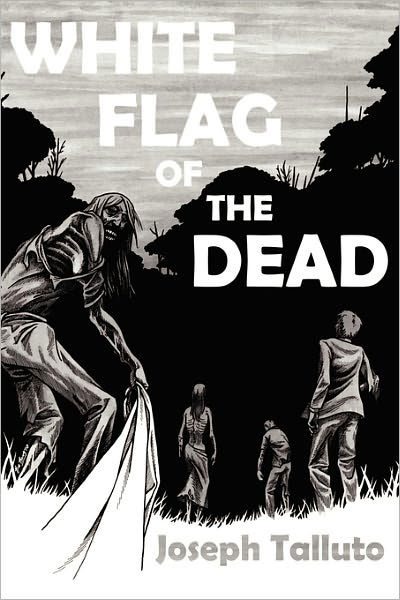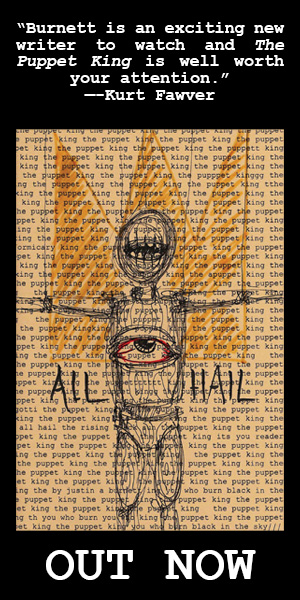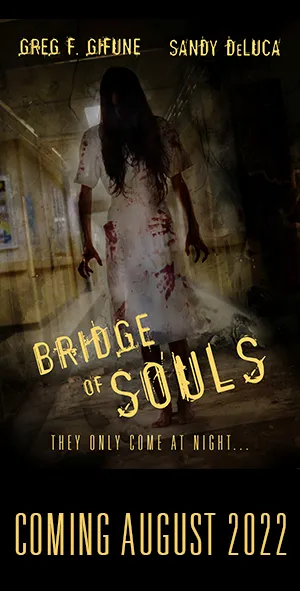Interview: Joseph Talluto
I had the pleasure of doing an interview with author Joseph Talluto. He is the author of the ‘White flag of the dead’ series from Severed press.
Red: What inspired you to write a zombie novel?
J.T: I had written several short stories before, but nothing that had anything to do with zombies. A friend of mine loaned me Max Brooks’ Zombie Survival Guide, and I thought it was hilarious. It got me interested in the living dead, and I began to read a few more books. After reading Day By Day Armageddon, an idea began to tickle the back of my head and refused to let go. I sketched out a quick chapter and showed it to my friend who had given me the Zombie Survival Guide. She read it in a day and asked for more. Suddenly, the story began to come alive as I began to think of scenarios, situations, characters and circumstances. I started to put together my characters and as the story made its way to the paper, it literally took off and practically wrote itself. Between the first and last chapter, the entire book took me roughly seven months to write. All the while my zombie-loving friend kept me going; telling me how much she loved the chapters I sent her and how she couldn’t wait for more. The book was constantly in my head, and I would have scenes or even lines I wanted to incorporate, and would write entire chapters just to put a scene in. That was how the pit of zombie heads came to be. I thought of it one day and I knew I had to put it in there somewhere, but it had to make some kind of sense.
This experience has really been my jumping off point in becoming a serious writer and I have to say it’s been a lot of fun. If I could do nothing but write full time, it would be a life well-lived in my mind.
Red: What is your opinion about the ongoing debate between what is scarier: shambling zombies or their running counterparts?
J.T: From a personal point of view, fast moving zombies are much scarier. Being chased by something that can run as fast as you can and never tire out is not a situation I find appealing. At least with shambling zombies, you have the fallback of running away from a bad situation. Shambling zombies are great for scenes where someone is trapped and the end is slowly creeping nearer. But a world where the zombies are fast? Most people would die, and quickly. Secure locations would take on new meaning and being able to travel without being seen would take on heavy priority.
Being a bit of a wise guy, I put both in my books.
Red: In your opinion, what traits must be present in order to classify something as a zombie?
J.T: In order for me to accept that something is truly a zombie, it needs to be dead first. I understand there is a need to break away from the traditional mold and have people act like zombies, yet still be alive, but that doesn’t work for me. True zombies, in my opinion, need to be dead, need to be decaying, and need to be unstoppable save for head trauma. To me, that’s what makes the zombie so terrifying. It won’t stop until you hit the brain with something. You can tweak the details a bit when it comes to the traditional zombie, but it has to be dead. In my third book, my characters wrestle with this a bit, bringing up the argument that maybe the zombies aren’t really dead. In the end, though they just accept them as something that needs to be removed.
Red: What are some of your future writing endeavors?
J.T: Currently I am working on the fifth and sixth books in the White Flag of the Dead series, with the possibility of a seventh. The last book would take place roughly twenty years in the future from White Flag, and would center on the children who grew up in an undead world. It would chronicle the adventures of Jake Talon, Julia James, and the other kids in the books. The older but still deadly duo of John and Charlie would make an appearance, but the focus would be on the kids and the world twenty years later. In addition, I have outlined the premise of a book which would be more of a thriller than a horror novel. It begins with a gruesome murder, and as the investigation digs deeper, it is discovered that an ancient order has been revived and is now seeking bring medieval justice to those who would threaten the members of a religious community. The conspiracy, it is discovered is world wide, and centers on one of the oldest religions in the world.
Red: What is the best piece of advice that you can give to other aspiring novelists out there? And what advice do you have for aspiring writers that want to tackle zombie literature?
J.T: The best piece of advice I can give aspiring writers out there is to focus on what you know. Take all of your interests, all of your hobbies and loves, and put them into print. Mark Twain once said “Write about what you know.†and I have to believe he knew what he was about. A second piece of advice would be to make sure you are aware of your audience. If you plan on writing horror novels, it would be best to read some of the more popular ones to get an idea of what people are looking for. For people who wish to tackle zombie literature, you have to make some decisions about your work. Will you choose to have traditional, Romero-esque zombies, or will you try for something a little different? Be careful, since there are hard-core purists out there who will scorch you if you don’t adhere to their notion of what a zombie is supposed to be. When you write, let the story get a life of its own. Let it take you places, let it flow from you. If you try too hard to get in the way, it will show up as such on the paper and won’t be what you want. There have been many times I have been writing and suddenly I will be going places I had no intention of going to before, or hadn’t even thought of moments before. But when the story works itself out through you, you just have to be ready to write.
Red: What is your opinion about zombie novel markets? Do you think zombie novels can establish a reputation of being well written, as opposed to being seen as just gore bound books? Or will zombie books never be seen as anything more than just gore?
J.T: I think the zombie genre is beginning to gain more and more credibility, and it is up to the publishers to demand better writing from author submissions. Zombie stories are relatively easy, they tend to follow the same pattern. There are the original bits and pieces out there, and they do tend to shine through the chaff. But I think the best way for zombie novels to gain ground is to have a story first and foremost, and then have zombies as part of the story, not the story itself. A well-written book will be well received, regardless of who reads it. Many people have been converted to fans thanks to the well-written novels of a few authors. Anyone can write a gory scene, its not that hard. But it takes some skill to have that scene evoke an emotion, something that hits a wide range of readers. For example: “The room was covered in gore, pieces of half-chewed flesh were scattered about, making identification of the victims impossible. Blood covered the walls in random fashion, as if chunks of dripping meat were flung about in search of tastier bits.†Pretty generic, nothing amazing. But if I add a small part, then I can hit you at an emotional level. “The room was covered in gore, pieces of half-chewed flesh were scattered about, making identification of the victims impossible. Blood covered the walls in random fashion, as if chunks of dripping meat were flung about in search of tastier bits. In the center of the coffee table, a single infant’s severed finger rested in a small pool of blood.†Suddenly, it hits you a little harder, that urge to protect just kicks in and you have to suppress a little burst of anger. This is something that separates the good zombie novel from the gore fest.
Red: What weapon would you use to survive the zombie apocalypse, if it were ever to happen?
J.T: My weapons would be based on range. What I mean by that is I would have layers of protection based on how close the danger was. For ranges of 50-300 yards, I would rely on a 5.56 chambered AR-15. Ammunition is fairly common, and 30-round magazines can be had cheaply at the present time. For closer ranges, say between 10-50 yards, I would have a 9mm handgun of a reliable make. 9mm is extremely common, and you are able to carry more of it than some other calibers. Additionally, high capacity magazines are available with out making the profile of the gun any different. For closer in work, I would like to have one of those billhooks that can cut a 3†sapling in half. Good rule of thumb is if it can cut 2-3 inches of wood in a single swipe, it can sever the spine of a zombie in the same fashion. Also, the longer handle means you can kill at a greater distance from yourself, always a plus. Finally, if the fight is right up in my face, I want a heavy knife with a thick spine, preferably 6â€, but no more than 8â€. A tanto blade is very good for skull penetration, as are spear points, but drop point blades might not work the way you want. Some might wish for crowbars and the like, but for zombies, you want skull penetration, not indentation. You don’t get to make a mistake twice.
That’s my arsenal, your mileage may vary.
Red: Who are 5 people, besides friends and family that you would want to be stuck with during the zombie apocalypse?
J.T: If we are talking about professions, then I would like to have an electrician, a plumber, someone who knows how to hunt and dress small and large game, a nurse (preferably ER) and a mechanic. An electrician would have the knowledge to determine if electricity was available and bring it to where we were located. A plumber would be able to determine the viability of water and how to bring it to where we were. A nurse would be more welcome than a doctor, simply because they are used to stress and tend to know more about how to handle people than doctors do. A mechanic would be a good choice for finding and keeping running any equipment we might have or need.
If we are talking about famous people, I really can’t think of anyone who would interest me enough to want to have them around for surviving the zombie apocalypse. Vacuous, self-absorbed celebrities would only serve as zombie fodder for me. Keep the undead busy while I made my escape kind of thing. I know it sounds harsh, but the new world needs to have people with a purpose, not just a name
Red: What character from the “White Flag of the dead” series would you want by your side during the zombie Apocalypse? (alive, dead or undead)
J.T: If I had to make a choice, I would like to have Charlie by my side. He’s absolutely fearless, a hunter and woodsman, and hates zombies with a passion. He is coldly calculating, and has the patience of a mountain. He will not hesitate to eliminate any threat to his well-being or the well-being of anyone he cares about. On top of that, he’s quiet, which is a huge plus in stressful situations. The last thing anyone needs in a zombie infestation is someone who chatters away inanely or complains endlessly.
Red: The characters in the series were well developed and personable. Were some of the characters in the story molded from real life people that you know?
J.T: A few of the characters were based on real life individuals, Dot was one, and Kevin Pierce another. Jake was based on my own son, and Mike Talon was manufactured around my own brother. Most of the other characters were personifications of personalities, and I tried to mix in as many as I could.
Red: Other than Romero’s “Of the Dead†movies, what movie(s) out there make a strong contribution to the zombie genre?
J.T: I actually believe movies like “Shaun of the Dead” and “Zombieland” make a good contribution to the zombie genre in that they can appeal to a wider audience other than the die hard fans. In those movies, the zombies are actually secondary to the story, which makes for a broader audience.
Red: The zombie literature market is growing at a great stride and there are a lot of new approaches to zombies from various authors, but what do you think makes a great zombie novel?
J.T: I think a great zombie novel begins with a slow approach to the epidemic, allowing characters to build and develop. I sometimes get annoyed by novels that throw people into a situation already blown and you spend half the book learning about the pasts of these people while they try to survive. Also, if the book is just about gore and death, it will have limited appeal, and none for me. If a book actually has a story and is going somewhere, then you will find yourself rooting for the characters and want to see how they resolve the issue despite the obstacles. A great zombie novel focuses on the story and the characters, not just the zombies. I could write about zombie gore all day long, but it doesn’t mean anyone will want to read past the first few pages. A good zombie novel will have you guessing about the final result, and leave you satisfied once you’re there.
Red: Thank you Joe for taking the time to do this interview, and for providing insight to fellow zombie aficionados, it has been a pleasure and I look forward to reading/reviewing more of your novels in the future. I really looked forward to reading the next instalments in the White Flag of the Dead series
It was a pleasure to do this Interview with Joseph Talluto. If you are ever looking for something fresh and new to throw on your zombie reading list, I advise The White flag of the dead series.
Interested in knowing more? Check out our White Flag of the Dead Review.







I read all 4 books and loved them all. Characters were well developed and made me want more. Im looking forward to book 5. One question… what happened to Zeus?
At first was reluctant to buy “White flag of the dead” basically it was the crap cover that put me off…it really is that bad, cover aside, it was a great read, i now have books 1-4 and i can’t wait for number 5!…You rock Joseph!